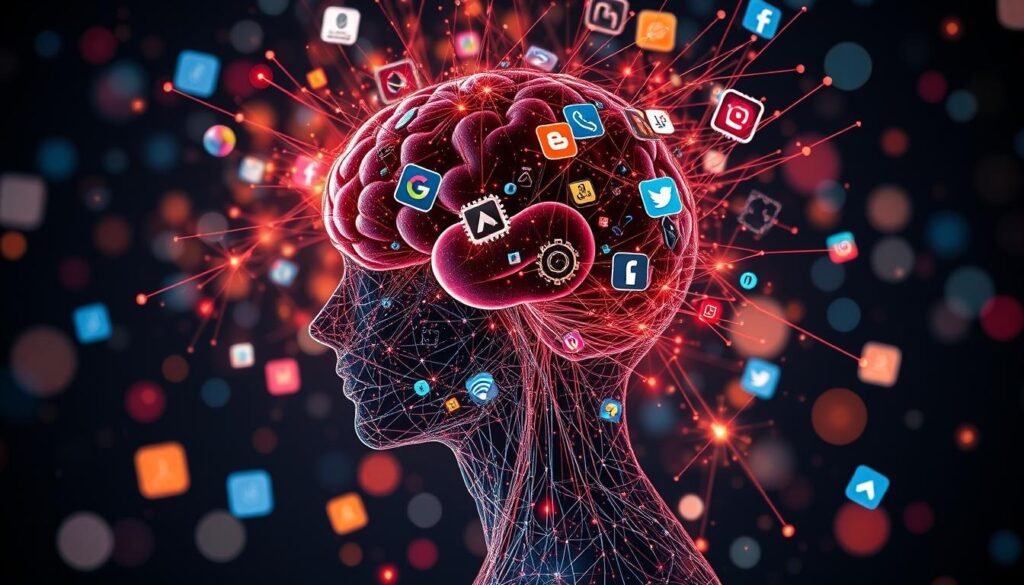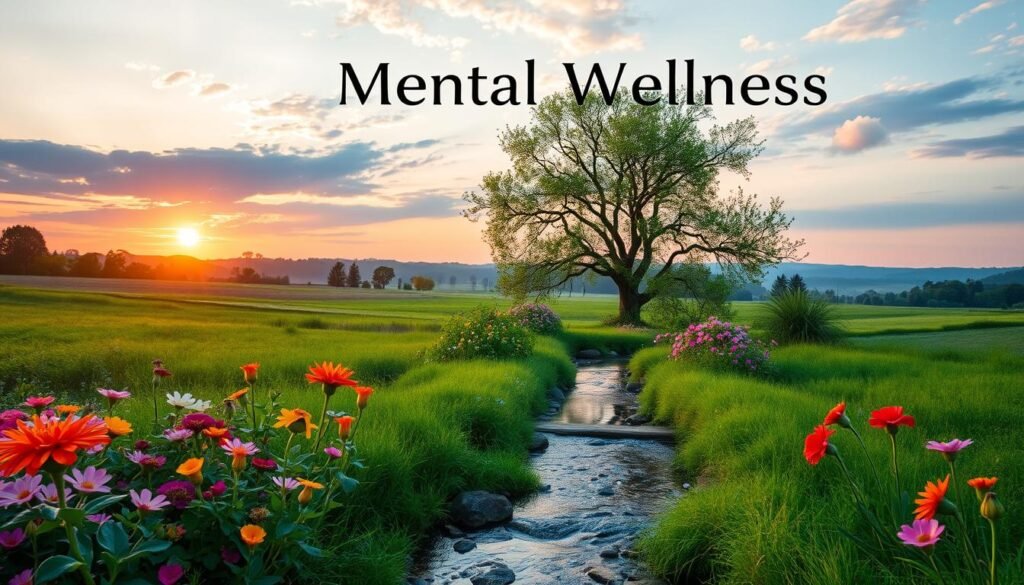Social media has changed how we talk, share, and connect. But how does it really affect our mental health? We’ll explore the good and bad sides of social media’s impact on our minds.
Does social media really help us feel connected, or does it harm our mental health? We’ll look at both sides, from the benefits of online communities to the dangers of comparing ourselves to others. Let’s find out how to keep our online and offline lives in balance.
Understanding the Digital Age Psychology
The digital world keeps changing, and it’s key to understand the psychological factors behind our online actions. This includes how social media evolves and how digital interactions affect our behavior today. We’ll explore the fascinating world of social media psychology and online behavior.
Evolution of Social Media Platforms
Social media has changed a lot in the last 20 years. What started as a way to connect with friends has grown into a huge network of digital communities. These changes have greatly affected how we talk, share, and interact online.
How Digital Interactions Shape Modern Behavior
Social media has become a big part of our lives, shaping our social, emotional, and thinking skills. It changes how we see and react to social signs and how we build and keep relationships. The digital interactions we have every day have deeply influenced our behavior today.
The Psychology Behind Online Engagement
Research has found many reasons why we engage with social media. We seek social validation and self-expression. We also enjoy instant gratification and continuous stimulation. Knowing these psychological factors helps us understand our digital behaviors better.
“The internet and social media have become the new frontiers for understanding human psychology and behavior.”
The Impact of Social Media on Mental Health: Positive and Negative Effects
Social media is a big part of our lives today. It shapes our experiences and affects our mental health. While it offers chances for pure mind life and better digital well-being, it also has risks we need to watch out for.
Social media can bring people together, help us connect, and let us share our lives. It lets us share our thoughts and passions, making us feel supported and connected. It’s also great for learning and staying updated on important news.
“Social media has the power to both uplift and harm our mental health. It’s crucial to strike a balance and use these platforms in a mindful, intentional way.”
But, social media can also hurt our mental health. Too much use and the need to look perfect online can cause anxiety, depression, and low self-esteem. Seeing others’ perfect lives can make us feel not good enough and lead to FOMO (Fear of Missing Out).
Also, social media can be addictive. It keeps us hooked with notifications and rewards, messing with our sleep and making us less productive. Cyberbullying and online harassment are big threats to our mental health, especially for those who are more vulnerable.
Dealing with social media’s ups and downs needs a careful approach. We must balance its good sides with steps to protect our pure mind life and digital well-being. Being aware of our use, setting limits, and using social media mindfully can help us enjoy its benefits while avoiding its downsides.
Digital Well-being in the Social Media Era
In today’s digital world, it’s key to balance our online and offline lives for our mental health. Being constantly connected and immersed in social media affects our well-being and life quality.
Balancing Online and Offline Life
It’s vital to find a balance between digital activities and real-life interactions. We can do this by setting limits, like specific times for social media or focusing on face-to-face talks. Managing our screen time helps us not get lost in the digital world, making room for real-life activities.
Creating Healthy Digital Boundaries
Setting clear digital habits is a big step towards better digital well-being. This means limiting notifications, avoiding constant device checks, and being mindful on social media. By doing this, we take back control of our attention and protect our mental health from social media’s negative effects.
Mindful Social Media Usage
Using social media mindfully helps us navigate the digital world better. It means being present, focusing on what we see, and choosing wisely how we spend our time online. Mindfulness leads to a more positive and fulfilling digital life.
“The key to digital well-being is finding a balance between the online and offline worlds, and being intentional about how we engage with technology.”
By using these strategies, we can improve our digital well-being and live a more pure mind life in the social media era.
Social Media Addiction: Recognition and Prevention
In today’s world, social media is everywhere. It’s easy to get caught up in it. This can lead to a serious problem: cyber addiction. It affects our mental health and how we feel about being online.
Knowing the signs of social media addiction is key. If you find yourself scrolling for hours or can’t stop checking your phone, it’s a problem. Feeling down or anxious when you can’t use social media is another sign.
Breaking the Cycle of Cyber Addiction
To stop social media addiction, we need to take action. Setting clear digital boundaries is a good start. This means limiting how much time you spend online and avoiding it at night. Using social media mindfully, choosing when and how to use it, can also help.
- Implement a digital detox by taking regular breaks from social media
- Identify and address the underlying emotional needs that drive social media usage
- Cultivate hobbies and offline activities to balance digital and physical worlds
- Seek professional help if social media usage is significantly impacting daily life
By spotting the signs of cyber addiction and taking steps to prevent it, we can take back control. We can enjoy social media in a healthier way.
Anxiety and Depression in the Digital Space
In today’s world, the impact of the internet on our mental health is a big worry. Social media and online chats shape our lives more and more. It’s key to know what causes anxiety and depression online.
Triggers and Warning Signs
Feeling anxious or depressed can come from many digital sources. For example, the endless updates on social media, the need to show a perfect online self, and the fear of missing out (FOMO) can all play a part. Common causes include:
- Too much time on social media and comparing to others
- Cyberbullying and online harassment
- Feeling overwhelmed by too much information and notifications
- Feeling lonely even when connected online
Signs of digital anxiety and depression might be feeling restless, irritable, or having trouble focusing. You might also feel unhappy or uneasy about your digital life.
Coping Mechanisms for Digital Stress
To fight the bad effects of the digital world on our minds, we need good ways to cope. Some effective strategies are:
- Digital detox – Taking regular breaks from the internet to refresh and connect with the real world.
- Mindful social media usage – Being careful about how much time and what we see online, focusing on meaningful interactions.
- Seeking support – Talking to friends, family, or mental health experts for help and support when feeling stressed online.
- Practicing self-care – Doing things that make us feel good, like exercising, meditating, or enjoying hobbies.
By knowing the causes and signs, and using healthy coping methods, we can handle the digital world better. This helps us keep our digital well-being strong against internet anxiety.
Virtual Communities: Double-Edged Sword
In today’s world, virtual communities are a big part of our lives. They give us a sense of connection and belonging. But, they can also affect our mental health in two ways. They offer a place to meet others, share experiences, and feel supported. Yet, they can also lead to echo chambers, social isolation, and a skewed view of reality.
Virtual communities bring people together based on shared interests or experiences. They are a powerful tool for online behavior and creating community. They provide a safe space for those who feel isolated or misunderstood. This is especially helpful for those who struggle to connect in the real world. But, these virtual communities can also make us feel disconnected from the real world, creating a gap between our online and offline selves.
- Virtual communities can provide a sense of belonging and support, particularly for those who may feel isolated or misunderstood in the physical world.
- However, they can also contribute to the formation of echo chambers, where individuals are exposed to a limited range of perspectives and ideas, reinforcing their existing beliefs and biases.
- The disconnect between online and offline identities can lead to a distorted perception of reality, as individuals may compare themselves to carefully curated digital personas.
The effect of virtual communities on mental health is complex. They can offer valuable connections and a sense of belonging. But, they can also worsen feelings of isolation, anxiety, and depression. It’s important to find a balance between online engagement and a healthy, well-rounded lifestyle that values face-to-face interactions and self-care.
“The internet has given us this amazing opportunity to stay connected with the people we care about, but it can also make us feel more alone.”
Self-Image and Social Media Perception
In today’s world, how we see ourselves and our bodies is linked to what we see on social media. The effects of social media on our self-esteem and body image are big concerns. The gap between what we see online and real life can deeply affect how we see ourselves.
Body Image Issues Online
Social media shows us beauty standards that are often unrealistic. Influencers and celebrities share photos that are not real, making us think what’s normal is not. Seeing these perfect images can make us feel bad about ourselves, leading to low self-esteem and eating disorders.
The Reality vs. Social Media Filter
The pictures we see online are not always true. They are often taken from special angles or edited to look perfect. This makes it hard for us to see the real people behind the photos. It can hurt our self-esteem impacts and make us see ourselves in a wrong way.
We need to understand how social media shapes our views. Looking at online content with a critical eye is important. By seeing the truth behind the perfect images, we can start to love ourselves more. We can learn to appreciate who we are, beyond what society expects.
“The most beautiful thing in the world is, of course, the world itself.”
Cyberbullying and Online Harassment
In today’s digital world, cyberbullying and online harassment are big concerns. These harmful actions, made easier by the internet’s anonymity, deeply affect people, especially young ones.
Cyberbullying involves bullying or harassing others online. It can be in many forms, like spreading hurtful messages or images. Social media makes it easy to share these, making the harm worse.
The effects of cyberbullying are serious. It can make people feel isolated, lower their self-esteem, and cause anxiety or depression. The constant nature of online interactions makes it hard for victims to find peace, leaving them feeling vulnerable and affecting their mental health.
“Cyberbullying is a silent epidemic that can have devastating effects on its victims. It’s crucial that we raise awareness and take proactive steps to address this growing issue.”
To fight cyberbullying and online harassment, we need a plan that includes education, tech solutions, and community efforts. Teaching people, especially the young, to spot and report these issues is key. We also need to promote digital kindness and responsible online behavior.
By highlighting the issue of cyberbullying and pushing for solutions, we aim to make the internet safer. We want a place where everyone can be themselves without fear of being bullied or harassed.
Social Comparison and FOMO Culture
Social media lets us share our lives and connect with others. But it also brings out the fear of missing out (FOMO) and social comparison. People often feel jealous of their friends’ perfect lives on social media.
Understanding Social Media Envy
Seeing perfect images on social media can make us feel envious. We might wish we had our friends’ success, relationships, or lifestyles. This envy can hurt our self-esteem and mental health.
Breaking Free from Comparison Traps
- Cultivate self-awareness: Recognize when you are engaging in social comparison and the negative emotions it can evoke.
- Practice gratitude: Shift your focus to appreciating what you have rather than coveting what others possess.
- Set digital boundaries: Limit your time on social media and be mindful of the content you consume.
- Engage in real-world connections: Prioritize in-person interactions and experiences that nurture your well-being.
- Reframe your perspective: Remind yourself that social media often presents a carefully curated and idealized version of reality.
By understanding social media’s impact and finding better ways to cope, we can escape the trap of comparison. This helps us have a more positive and fulfilling online experience.
“The key to breaking free from social comparison is to cultivate a deep sense of self-worth that is not dependent on the lives of others.”
Digital Detox: Benefits and Strategies
In today’s world, we’re always connected to social media and tech. This makes a digital detox more important than ever. It helps us take back control of our mental health and find balance in life.
Stepping away from digital distractions has many benefits. It lets us cultivate a pure mind life, reducing anxiety, depression, and stress. We can also reconnect with our passions, strengthen real-life relationships, and find new purpose.
Strategies for a Successful Digital Detox
- Set boundaries: Choose times and places where you won’t use digital devices, like during meals or before bed.
- Engage in offline activities: Try hobbies, exercise, or spend time with loved ones without tech distractions.
- Limit social media use: Delete apps or set time limits to stop mindless scrolling.
- Practice mindfulness: Try meditation, deep breathing, or other mindfulness to stay present.
- Embrace nature: Spend time outdoors to reconnect with your senses and find calm.
“Disconnecting from the digital world can be a transformative experience, allowing us to reconnect with ourselves and the people and experiences that truly matter.”
By using these strategies, you can start a journey of digital well-being. You’ll rediscover the joy of living in the moment, away from tech’s constant pull.
Building Healthy Online Relationships
In today’s world, virtual communities and online behavior are key to social interactions. It’s important to find a balance between real-world bonds and digital connections. This balance is crucial for healthy relationships.
Authentic Connections in Virtual Spaces
The internet makes it easy to connect with people worldwide. But, it’s vital to be authentic and intentional in these virtual communities. Real conversations, shared moments, and trust can turn online interactions into deep relationships. Focus on quality over quantity to feel a sense of belonging and support.
Maintaining Real-World Bonds
Remember, real-world relationships are just as important as online ones. Face-to-face interactions and quality time with loved ones are essential. They help keep a balance between online and offline lives. This way, your online presence can enhance, not replace, your social life.
“The greatest gift you can give someone is your presence.” – Thich Nhat Hanh
Building healthy online relationships means being mindful of both digital and physical connections. By finding a balance, we can create a rich mix of relationships. These relationships can make our lives better, both online and offline.
Youth Mental Health and Social Media
Today’s youth live in a world where social media is a big part of their lives. This mix of young minds and social platforms brings both challenges and chances for mental health. It’s key to understand the social media psychology to help the next generation.
Adolescence is a time when young people form their identities and develop socially. Social media can deeply affect this, shaping self-esteem, social skills, and mental health. Cyberbullying, for example, is a big problem, causing pain and exclusion for many young users.
- It can lead to anxiety, depression, and low self-worth because of constant comparison and the need for a perfect online image.
- It can mess up sleep and brain function because of too much screen time.
- It can make it hard to build real-life friendships and learn how to communicate face-to-face.
But social media also offers chances for connection, self-expression, and learning. Used wisely, it can create a sense of community, offer mental health help, and let young people explore their interests.
“The key is to strike a balance, empowering young users to navigate the digital landscape with resilience and emotional intelligence.”
To tackle the complex issues of social media psychology and its effects on youth mental health, we need a broad approach. It’s crucial for parents, teachers, and mental health experts to work together. They should aim to promote digital wellness, encourage healthy online habits, and support the well-being of the next generation.
Professional Help and Digital Wellness Resources
If social media is affecting your mental health, there’s help available. Therapists, counselors, and mental health groups offer support. They provide online therapy, digital detox programs, and tips for healthy tech use.
The Pure Mind Life initiative offers many digital well-being tools. You can find self-assessment tools, mindfulness exercises, and workshops. These resources help you balance your social media and tech use.
There are also mobile apps and online platforms for digital well-being. They include content blockers, screen time tools, and mindful tech communities. These can help you manage your digital habits and improve your relationship with social media.



